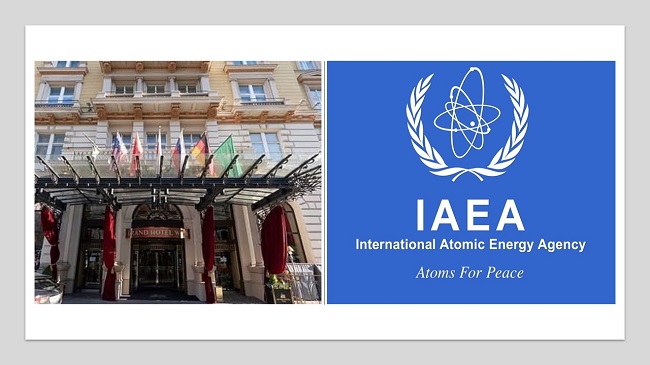What is the point of the IAEA negotiations with the Iranian regime and the JCPOA negotiations?
There has been contradictory news about the recent negotiations between the Iranian regime and world power. Clearly, the Iranian regime is dragging its feet with the negotiations. But what would be the result.
The fate of the seventh round of Vienna talks is in limbo after the end of a month-long agreement and the insistence of Rafael Grossi, director-general of the International Atomic Energy Agency (IAEA), and some Western countries on reforming the deal and not accepting the regime’s demand of returning to the same deal.
Remarks on the side of the Iranian regime
On the Iranian side, all remarks confirm the escalation of the conflict with the IAEA.
“We will no longer return the videos recorded at the nuclear facility to the IAEA,” said Qalibaf, the speaker of the regime’s parliament.
On Sunday, June 27, 2021, he added about the extension of the agreement: “Nothing has been extended, and none of the items recorded inside will ever be given to the Agency.” However, he did not talk about deleting them.
But Khatibzadeh, a spokesman for Iran’s foreign ministry, said in a statement on Monday: “We have not made a decision on whether to clear the agency’s camera data.”
Meshkini, a spokesman for the parliament’s National Security Commission, said: “Iran’s red line in the UN Security Council is to lift all sanctions and ensure that they are lifted. ».
He added: “The resistance of the West, especially the United States, to not guarantee the fulfillment of its obligations is questionable. The United States wants to maintain some of the sanctions at all costs, which shows that they are seeking to use the trigger mechanism.”
“Iran has no obligation beyond safeguards to the International Atomic Energy Agency, and Mr. Grossi’s idea of extending the three-month agreement between Iran and the IAEA is a misconception,” said Amoie, a member of the regime’s parliament security commission.
Finally, the government’s spokesman Ali Rabiee announced on June 28 that the Iranian regime had not yet decided on the Vienna talks and that the continuation of the negotiations might be postponed to the next government.
“Once we extended the agreement, but this extension should not lead to erosive negotiations,” he added. “The other side must live up to its obligations, and Iran’s relationship with the IAEA will be based on safeguards if the agreement is not implemented.”
With these statements already made, it seems that the mullahs’ regime is abusing the discussion of extending the agreement with the Atomic Energy Agency as a means of bargaining in the nuclear talks in Vienna along with the lifting of further US sanctions.
The West must be aware of such abuses by the International Atomic Energy Agency and IAEA technical oversight of the Iranian regime’s nuclear program.
About the next round of talks
The Iranian regime has thrown the ball to the court of the international community. It claims that the clerical regime has made a “difficult decision.” “Now it is the turn of the other sides to decide and conclude on the revival of nuclear deal, also known as the Joint Comprehensive Plan of Action.
“We have negotiated enough,” Khatibzadeh, a spokesman for the regime’s foreign ministry, added.
Western concerns over non-renewal of IAEA agreement with Iran
But on the other hand, what overshadows the JCPOA negotiations is the international community’s growing concern.
U.S. Secretary of State Antony Blinken said “any failure to extend it would be a “serious concern” for broader negotiations,” Reuters wrote.
The French Foreign Ministry also warned the Iranian regime that Iran should immediately access the IAEA. They regretted the regime’s lack of cooperation with the IAEA.
In the United States, Republican Sen. Jim Risch has suggested that should halt talks with Tehran for not renewing the nuclear deal.
In addition, US President Joe Biden declared on June 27, “What I can say to you is that Iran will never get a nuclear weapon on my watch.”
U.S.-Iran conflict intensifies
In parallel with the direct order for the bombing of militant positions backed by the Iranian regime on the Iraqi-Syrian border, Joe Biden’s stance shows that the developments on both sides are intensifying the conflict between the two countries.
During the recent negotiation over the JCPOA, although these two countries are the two main parties, they have not negotiated directly so far. They have done their work through other intermediary countries.
Maintain many sanctions in the event of a return to the 2015 agreement
“The likely outcome for the JCPOA (Joint Comprehensive Plan of Action) negotiations is a return to the 2015 agreement, which would keep many sanctions in place. Such a limited agreement would deter significant investment by Western firms, making a sharp pickup in growth unlikely,” said the IIF.
As a result, the Vienna talks and the agreement with the IAEA have both become the scene of conflict between the mullahs’ regime and the international community, contrary to the remarks by the regime’s Supreme Leader, Ali Khamenei, that the talks should not be erosive.
Before calling these negotiations erosive, given the position of US officials that either agreeing on everything or nothing, the current situation is a dead-end for the Iranian regime. The US has indirectly underlined it would withdraw from Vienna talks if its interests are not served
If we add to Khamenei’s current crises other issues such as terrorism, missiles and human rights violations and playing with the extension of the agreement with the IAEA; It will be a hanging rope for the Iranian regime, not a lifeline.
